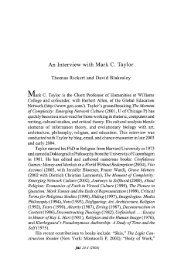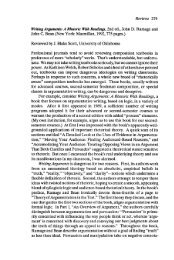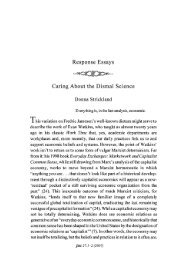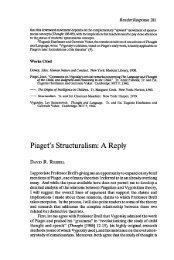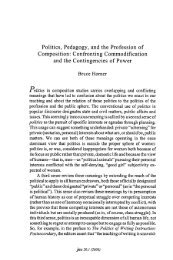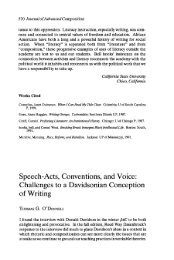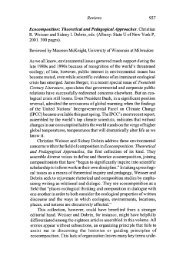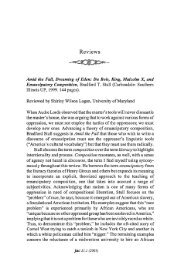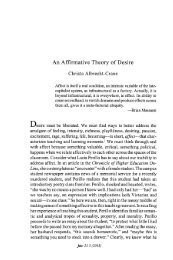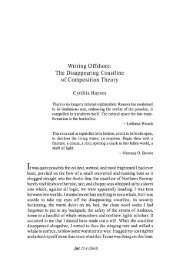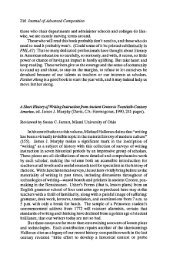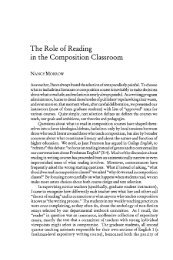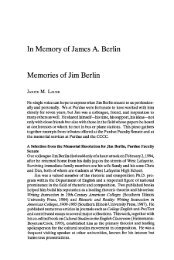It's aQuestion ofFaith: Discourses of Fundamentalism ... - JAC Online
It's aQuestion ofFaith: Discourses of Fundamentalism ... - JAC Online
It's aQuestion ofFaith: Discourses of Fundamentalism ... - JAC Online
Create successful ePaper yourself
Turn your PDF publications into a flip-book with our unique Google optimized e-Paper software.
<strong>Discourses</strong><strong>of</strong> Fundementalism 335<br />
the way that students inthis particular classresponded. Asthe term progressed, a<br />
block <strong>of</strong> seven students (out <strong>of</strong> 18)who identified themselves as "Conservative<br />
Christians" started to make their resistancevisibleandvocal:they sattogether in a<br />
cluster <strong>of</strong>two tables,they dominated classdiscussions,andsome<strong>of</strong>them refusedto<br />
readorwrite about assignedtexts. Asateacher,Iwasfrustrated by my inability to<br />
connect with these students, andI wasangrywith the waysthat they treated other<br />
students in the class. As aresearcher, though, I was intrigued by these students'<br />
responses to classdiscussionsand assignedreadings, particularly in terms <strong>of</strong> the<br />
grounds<strong>of</strong>authority upon whichthey assertedthemselves.At semester'send,both<br />
Mindy andIdiscussedthewaysthat religiousdifferenceseemedto playanimportant<br />
part in how the students had responded to the course assignments and to me.' In<br />
attemptingto writeaboutthiscourseformy dissertation,then, Ibeganto explorethe<br />
literature<strong>of</strong>fundamentalismandtoconsidermorefullywhy fundamentalistdiscourse<br />
seemed to be more powerful and attractive for many <strong>of</strong> the students than the<br />
discourses<strong>of</strong> criticalpedagogythat I had initially hoped to enact.'<br />
My own consciousnessregardingtheterm "fundamentalist"emergedinconcert<br />
with the 1994politicalelectionandpublicdiscourseabout the risinginfluence<strong>of</strong>the<br />
"ReligiousRight" inAmericansociety.Popular newsmagazinessuchasNewsweek<br />
and Timeandtelevisionshowssuchas48Hourshaveallpr<strong>of</strong>iled,invaryingdegrees,<br />
the rise<strong>of</strong>"fundamentalism"withinU.S.culture.Within academiccircles,MartinE.<br />
Marty andR. ScottAppleby's FundamentalistProject-a multi-million dollar,sixyear,six-volumestudycomparingfundamentalismsaroundtheworld<br />
supportedby<br />
the American Academy<strong>of</strong>Arts andSciences-reflects how scholarshavebegun to<br />
attendto fundamentalistbeliefasameans<strong>of</strong>interpretingsocialandpoliticalbehavior.<br />
Whileaslateasthe 1960smostfundamentalistseschewedpoliticalactionassecondary<br />
to the goals<strong>of</strong>missionaryconversion,recentlyfundamentalistdiscourse-through<br />
the politicalpower <strong>of</strong>the ChristianCoalition andthe conservativethink tankswith<br />
which it isallied-has shapedthe U .5.culturalandpoliticalscene.And whileschool<br />
curriculum hashistoricallybeenasite<strong>of</strong>contest overdifferentreligiousbeliefsand<br />
values,increasingly,fundamentalistshavenamedschoolsasaprimarysiteforpolitical<br />
action. Indeed, debates about the role <strong>of</strong> religiousbeliefin public education have<br />
becomealmostmainstream,with proposedconstitutionalamendmentsto legitimize<br />
groupprayerintheclassroom,callsforvouchersto fundstudentenrollmentinprivate<br />
Christian schools,andcurrent lawsuitsinstatessuchasAlabamato allowChristian<br />
religiousactivities,suchasBiblereadingandthe posting<strong>of</strong>the ten commandments,<br />
within K-12publicschools(Kaniiner).<strong>It's</strong> not surprising,then, that students' texts<br />
andresponsesreflectandproducethislargerculturaldiscourse.But giventhat many<br />
<strong>of</strong>theseactivitiesaresupportedby Christiansandotherswho donot namethemselves<br />
asfundamentalist, usingthe term "fundamentalist" asameans <strong>of</strong> understanding<br />
behavioriscomplicated.<br />
In its historical sense Christian fundamentalism describes "a coalition <strong>of</strong><br />
conservative, predominantly Calvinist, Protestants that emerged from within a<br />
broader, more ecumenicalevangelicalculture inthe latenineteenth century" based<br />
on the fivefundamentals <strong>of</strong> faith (Bendroth 4). Basedon the 1895Niagara Bible



